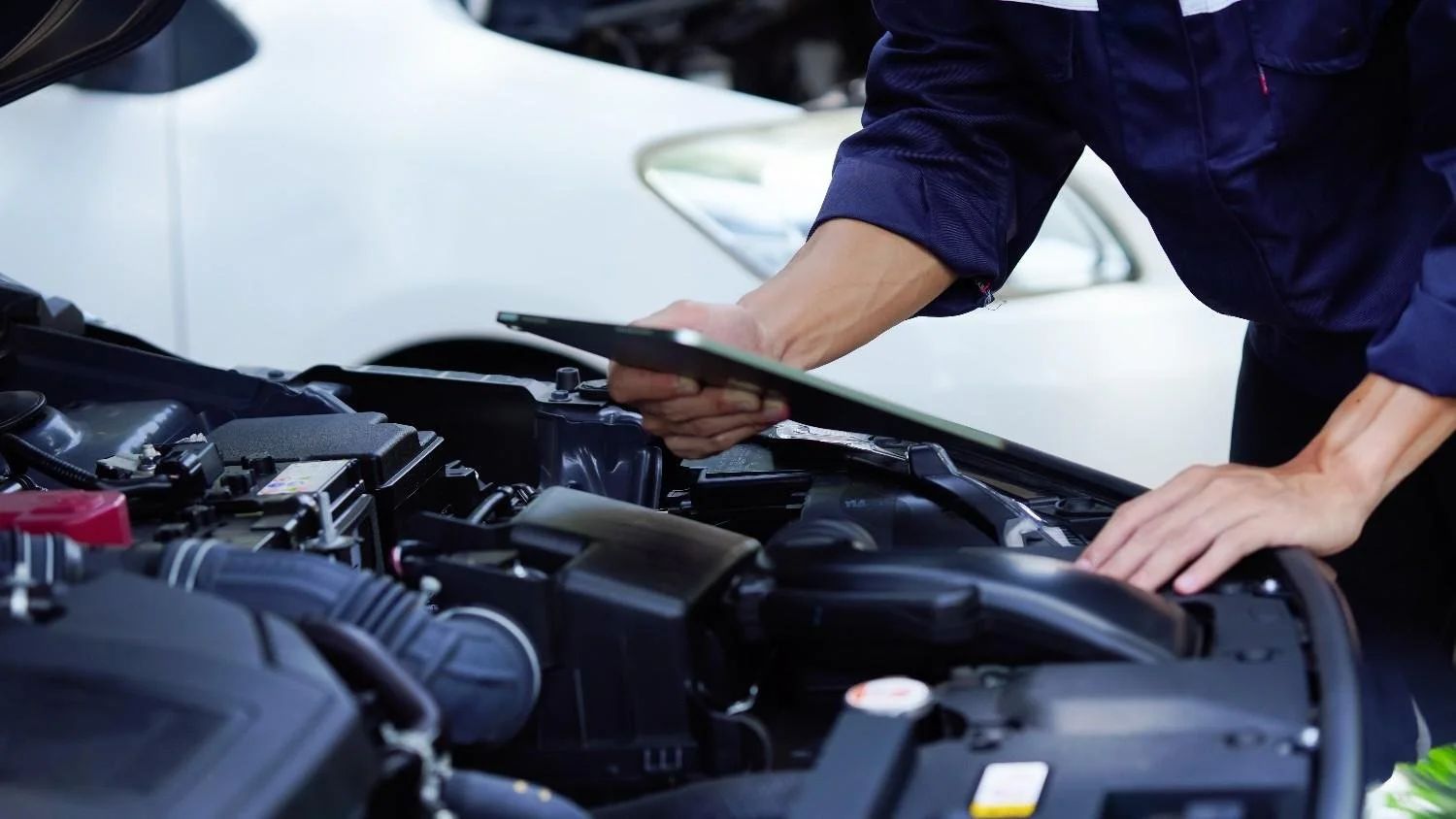Electric Car Maintenance Guide: Costs & Servicing In 2026
Image source: Shutterstock
Electric cars are often described as simpler machines when compared with petrol and diesel alternatives. When it comes to maintenance, that simplicity makes a real difference! With far fewer moving parts than petrol or diesel vehicles, EVs cost around 50% less to maintain, averaging £165 per year compared to £300 for an equivalent petrol car.
If you’re considering an EV through The Electric Car Scheme, maintenance becomes even simpler. All servicing, tyres, breakdown cover, and repairs are included in one fixed monthly payment, so you don’t need to worry about unexpected bills or rising costs over time.
In this guide, we’ll walk you through how electric car maintenance works in 2026, what servicing an EV actually involves, and why salary sacrifice removes much of the hassle altogether. You’ll also find a clear cost comparison, a realistic maintenance schedule, and answers to the most common EV maintenance questions!
Why Do EVs Need Less Maintenance?
Electric cars are built very differently from petrol and diesel vehicles. Instead of relying on complex engines with thousands of moving parts, EVs use simpler electric motors and electronic systems. This design removes many of the components that traditionally wear out or fail, reducing both servicing time and long-term costs.
What Makes Electric Cars Cheaper To Maintain?
Fewer Moving Parts
A typical internal combustion engine contains 2,000+ moving components. An electric motor, by comparison, has closer to 20. This eliminates the need for oil changes, spark plugs, timing belts, exhaust systems and many routine repairs that petrol drivers are used to.
Regenerative Braking
EVs use regenerative braking to slow down while recharging the battery. This significantly reduces wear on brake pads and discs, which often last two to three times longer than those on petrol cars.
No Traditional Transmission
Most electric cars use a single-speed gearbox, meaning there’s no clutch and no multi-gear transmission to service or repair - another common source of maintenance costs removed.
Simpler Cooling Systems
Electric vehicles don’t generate the same heat as combustion engines, so their cooling systems are less complex and less prone to failure.
Typical annual costs in 2026:
Average EV maintenance: £165 per year
Average petrol maintenance: £300 per year
Saving: £135 per year (around 45%)
Maintenance Included In The Electric Car Scheme
While EVs are cheaper to maintain overall, individual costs like tyres or windscreen repairs can still add up. Salary sacrifice removes that uncertainty by bundling everything into one predictable monthly payment.
Why Maintenance Costs Aren’t A Concern With Salary Sacrifice
With The Electric Car Scheme, maintenance isn’t an optional extra or something you need to budget for later - it’s already included from day one.
What’s Included In The Electric Car Scheme Salary Sacrifice Package
Every package includes:
All scheduled servicing
Tyre replacement (wear and accidental damage)
Brake maintenance when required
24/7 roadside breakdown cover
Windscreen repair and replacement
MOTs from year three
Image source: Shutterstock
How Does Inclusive Maintenance Work?
Servicing is simple and hassle-free. You book through The Electric Car Scheme’s portal, visit an approved service centre, and drive away without paying anything at the garage. All costs are covered within your monthly payment.
Tax Efficiency Of Included Maintenance
Maintenance paid personally comes from post-tax income. Through salary sacrifice, it’s paid before tax, reducing the real cost.
Example:
Maintenance value: £800 per year (£67/month)
Paid personally: £67/month
Via salary sacrifice: £40–£53/month effective cost
Saving: £168–£324 per year
Built-in protection helps remove financial risk if your circumstances change during your lease. Maintenance and servicing costs remain managed, giving you and your employer added peace of mind.
The Electric Car Scheme Vs Personal EV Ownership Comparison
The table below shows how electric car maintenance costs compare when you pay for everything yourself versus having all maintenance included through a salary sacrifice lease!
| Maintenance Aspect | Personal EV Ownership | TECS Salary Sacrifice |
|---|---|---|
| Annual servicing | 165 | ✓ Included |
| Tyres (every 2–3 years) | £400–£600 | ✓ Included |
| Breakdown cover | £100–£150 | ✓ Included |
| Unexpected repairs | Your cost | ✓ Included |
| Administration | Your time | Handled |
| Tax efficiency | After-tax | Pre-tax |
| Total annual cost | £665–£915 | £400–£550 effective |
What Does An EV Maintenance Schedule Look Like?
One of the biggest surprises for new EV drivers is how little servicing is actually required. Most checks are preventative rather than repair-focused, which keeps appointments short and costs low!
What Maintenance Do Electric Cars Actually Need?
Annual Service Items
Brake system inspection
Suspension and steering checks
Tyre condition and pressure
Cabin filter replacement
Cooling system inspection
Software updates
Battery health assessment
Typical service time: 45–60 minutes.
Image source: Shutterstock
Every 2 Years
Brake fluid replacement
Air conditioning service
Battery coolant check (model-dependent)
Every 3–5 Years
Transmission fluid (some models)
In-depth battery diagnostics
As Needed
Tyres: 20,000–40,000 miles
Wiper blades
12V battery (5–7 years)
Brake pads (often 80,000+ miles)
EV Maintenance Costs By Mileage
Rather than paying for servicing and wear-and-tear as and when it comes up, EV maintenance costs tend to appear at predictable mileage milestones.
| Mileage | Service Items | Approx Cost (Personal) | TECS |
|---|---|---|---|
| 10,000 | Annual service | £150–£200 | ✓ |
| 20,000 | Service + possible tyres | £550–£800 | ✓ |
| 30,000 | Major service | £200–£300 | ✓ |
Common EV Maintenance Issues
Electric cars are highly reliable, but like any vehicle, they aren’t completely maintenance-free. The good news is that the issues EVs experience tend to be minor and predictable.
What Can Go Wrong With Electric Cars?
Tyre wear: EVs are heavier, so tyres can wear faster. Regular rotation helps, and replacements are included via The Electric Car Scheme.
12V battery failure: This battery powers accessories rather than driving. Occasional replacement may be needed and is covered.
Software glitches: Usually resolved via over-the-air updates or a quick dealer reset.
Battery degradation: Minimal during a typical lease and not a maintenance concern for salary sacrifice drivers.
What EV Maintenance Can You Do Yourself?
EVs still benefit from basic owner checks between services. You can easily manage tyre pressures, top up washer fluid, carry out visual inspections, and keep the car clean.
Beyond that, most EV maintenance requires specialist tools and training. If you’re using The Electric Car Scheme, everything else is handled for you.
Total Maintenance Costs Over A Typical 3-Year Lease
Looking at individual service items can be misleading, as costs tend to appear gradually over time. When you step back and compare maintenance spend over a full three-year lease, the difference between petrol cars, personally owned EVs, and salary sacrifice becomes much clearer.
The table below shows a realistic comparison of total maintenance costs over three years, based on typical UK driving and servicing patterns.
| Vehicle Type | Maintenance Cost Breakdown | Total 3-Year Cost |
|---|---|---|
| Petrol Car (e.g. Ford Focus) | Services (£900) Tyres (£400) Brake pads (£200) Oil changes (£300) Misc repairs (£500) | 2,300 |
| Electric Car – Personal Ownership (e.g. VW ID.3) | Services (£500) Tyres (£600) Brake fluid (£100) Misc repairs (£200) | £1,400 |
| Electric Car via The Electric Car Scheme | All maintenance included. Paid pre-tax via salary sacrifice | ~£840 effective cost |
What This Comparison Shows
Over three years, electric cars already deliver substantial savings compared to petrol vehicles thanks to simpler servicing and reduced wear. However, the biggest difference comes from salary sacrifice, where maintenance costs are bundled into your lease and paid before tax.
In practical terms, that means:
£1,460 saved vs a petrol car
£560 saved vs personally owning an EV
No unexpected bills, no budgeting for repairs, and no exposure to rising maintenance costs
It’s this combination of lower EV servicing needs and inclusive, pre-tax maintenance that makes salary sacrifice such a compelling option for drivers looking for predictable, stress-free driving!
Frequently Asked Questions About Maintenance
Do Electric Cars Need Less Maintenance Than Petrol Cars?
Yes. EVs require around 50% less maintenance due to far fewer moving parts, no oil changes and reduced brake wear from regenerative braking.
Is Maintenance Included In The Electric Car Scheme?
Yes. All servicing, tyres, breakdown cover and repairs are included in every package, removing unexpected costs.
How Often Do Electric Cars Need Servicing?
Most EVs need servicing once a year or every 10,000–12,000 miles, compared to more frequent visits for petrol cars.
Do EV Brakes Wear Out?
Rarely. Regenerative braking means brake pads often last over 80,000 miles.
What Maintenance Do Electric Cars Need?
Mainly annual health checks, tyre care, brake inspections and occasional fluid replacements.
How Much Does EV Servicing Cost?
Typically £150–£200 per service if paid personally, but it’s fully included with The Electric Car Scheme.
Do I Save Tax On Maintenance Through Salary Sacrifice?
Yes. Maintenance is paid pre-tax, delivering savings of around 20–40%.
Can I Service My Salary Sacrifice EV Anywhere?
Servicing is done at approved service centres and booked through The Electric Car Scheme system.
What Happens If My EV Breaks Down?
24/7 roadside assistance is included, so help is always available.
Are EV Tyres More Expensive?
They can be slightly more expensive, but all replacements are included with The Electric Car Scheme’s salary sacrifice offering.
Do Electric Cars Need Oil Changes?
No. EVs don’t use engine oil, saving £50–£80 per service compared to petrol cars.
How Long Does An EV Service Take?
Most EV services take 45–60 minutes, compared to 2–3 hours for petrol cars.
Electric car maintenance in 2026 is simpler, quicker and far more affordable than many drivers expect. With fewer moving parts, longer service intervals and reduced wear on key components, EVs naturally cost less to look after than petrol cars.
When you choose an electric car through The Electric Car Scheme, those savings become even more predictable. With servicing, tyres and repairs included and paid pre-tax, you can enjoy electric driving with fewer surprises - and more confidence in your monthly costs.
Are you an employer?
BOOK A DEMOAre you an employee?
SEE AVAILABLE CARSLast updated: 02/02/2026
Our pricing is based on data collected from The Electric Car Scheme quote tool. All final pricing is inclusive of VAT. All prices above are based on the following lease terms; 10,000 miles pa, 36 months, and are inclusive of Maintenance and Breakdown Cover. The Electric Car Scheme's terms and conditions apply. All deals are subject to credit approval and availability. All deals are subject to excess mileage and damage charges. Prices are calculated based on the following tax saving assumptions; England & Wales, 40% tax rate. The above prices were calculated using a flat payment profile. The Electric Car Scheme Limited provides services for the administration of your salary sacrifice employee benefits. The Electric Car Scheme Holdings Limited is a member of the BVRLA (10608), is authorised and regulated by the FCA under FRN 968270, is an Appointed Representative of Marshall Management Services Ltd under FRN 667174, and is a credit broker and not a lender or insurance provider.
Copyright and Image Usage: All images used on this website are either licensed for commercial use or used with express permission from the copyright holders, in compliance with UK and EU copyright law. We are committed to respecting intellectual property rights and maintaining full compliance with applicable regulations. If you have any questions or concerns regarding image usage or copyright matters, please contact us at marketing@electriccarscheme.com and we will address them promptly.



